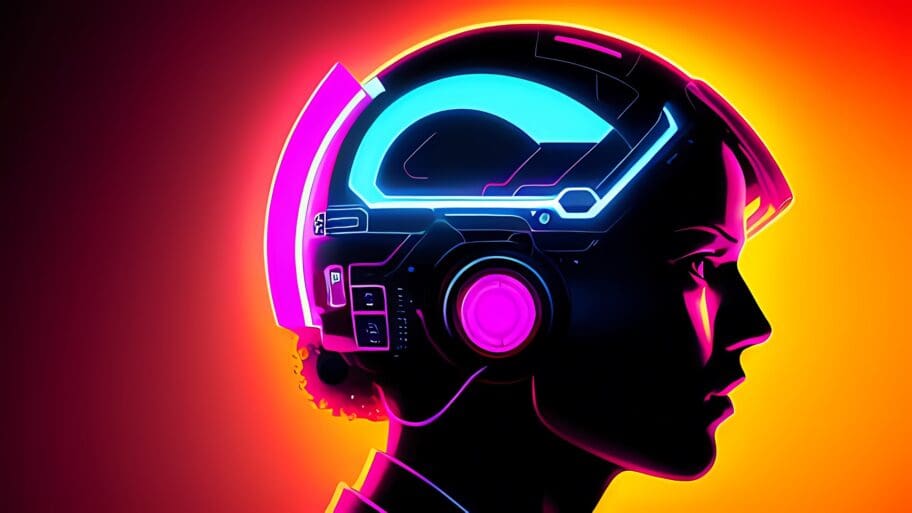Chatbots, powered by advanced AI, have come a long way since their inception. But what does the future hold for these digital marvels? Fast forward to 2023, and we find ourselves at a pivotal moment in the development and widespread adoption of chatbot technology.
Businesses from various sectors are increasingly harnessing the power of chatbots, like Facebook Messenger, to revolutionize customer experiences and streamline operations. In fact, statistics reveal that over 80% of companies plan to integrate chatbots and AI into their customer service strategies by next year. The future of chatbots is now, as they continue to redefine how organizations engage with customers and optimize their workflows. Get ready for a glimpse into tomorrow's world where chatbots, like those used in call centers and Google, reign supreme.

The year 2023 marks an exciting turning point in the evolution of chatbots – from simple text-based tools to intelligent conversational agents capable of understanding human language nuances and providing personalized assistance. As businesses strive to meet rising customer expectations, leveraging chatbot technology, including voice assistants, has become imperative.
These virtual helpers enable companies to deliver instant support round-the-clock while reducing costs associated with human resources. From retail giants enhancing shopping experiences to healthcare providers streamlining patient interactions, organizations across industries are embracing this game-changing innovation. In fact, even call centers are starting to use chatbots on platforms like Facebook Messenger and Google.
The Future of Chatbots and AI
Artificial Intelligence (AI) is revolutionizing the way we interact with technology, and chatbots, along with voice assistants, are at the forefront of this transformation. As chatbots continue to evolve, their potential for becoming more intelligent and versatile in human interaction is expanding. In the coming years, advancements in AI will play a crucial role in shaping the capabilities of chatbots, overcoming challenges and improving messaging experiences.
One of the key areas where AI will have a significant impact on chatbots is natural language processing (NLP). NLP enables machines to understand and interpret human language, allowing chatbots to engage in more meaningful conversations. With improved NLP algorithms, chatbots will be able to comprehend context, emotions, and even complex queries. This means that users can communicate with voice assistants naturally, as if they were talking to another person. Additionally, this advancement in tech will greatly enhance the content provided by users.
Machine learning is another aspect of AI that will contribute to the future development of chatbots. By leveraging vast amounts of data, machine learning algorithms enable voice assistants to continuously learn and improve their performance over time. This iterative process allows them to provide more accurate responses and personalized experiences for users with tech-related customer queries. Additionally, machine learning plays a crucial role in enhancing the content delivered by chatbots.
The integration of AI into chatbot systems helps brands in the customer service era. Businesses can deploy intelligent chatbots to handle customer inquiries via emails efficiently and effectively. These bots can analyze large volumes of information and provide relevant solutions or recommendations based on individual needs.
Moreover, as AI continues to advance, we can expect chatbots to become increasingly proactive in handling customer queries and emails. They will be able to anticipate user needs by analyzing patterns from previous interactions or understanding user preferences through machine learning algorithms. This proactive approach will enhance user experience by providing timely assistance or suggestions without waiting for explicit requests, thereby helping brands build stronger relationships with their customers.
In addition to their application in customer service, AI-powered chatbots can also help brands with their emails. They have great potential in fields such as healthcare, education, e-commerce, and entertainment. For example, brands can use AI-powered chatbots to help with their email campaigns.
- In modern healthcare settings, virtual health assistants powered by AI could help with customer queries, provide personalized medical advice, monitor patients remotely, and offer support for mental health through emails.
- In education, chatbots can help as virtual tutors, using AI tools to offer personalized learning experiences. They use emails to adapt to individual student needs and provide real-time feedback.
- In e-commerce, chatbots can help customers through the purchasing process, recommend products based on preferences and previous purchases, answer questions about shipping or returns, and assist with emails and phishing using AI tools.
- In the entertainment industry, AI-powered chatbots could help enhance gaming experiences by creating dynamic and interactive virtual characters that respond intelligently to player actions, while also providing protection against phishing attempts.
Key Trends and Statistics for Chatbots in 2023
By 2023, it is estimated that over 80% of businesses will have implemented some form of chatbot automation to help enhance customer experiences and streamline business operations. This trend signifies the growing recognition of chatbots as valuable tools for businesses in combating phishing attacks, as they can provide instant responses and personalized interactions to protect against potential threats. Chatbots offer a convenient and efficient solution for businesses across various industries to combat phishing attacks.
Customer service remains the top use case for chatbots, with around 67% of consumers having interacted with one for help and support. In today's fast-paced world, customers expect quick resolutions to their queries and issues. Chatbots help enable companies to deliver prompt assistance round the clock, ensuring customer satisfaction while reducing the workload on human agents. By leveraging natural language processing (NLP) capabilities, chatbots can understand user inquiries and provide relevant information or solutions in real-time.

The global market size for chatbot technology is projected to reach billions by 2023, with substantial growth indicating increasing adoption of chatbot solutions by organizations worldwide. As businesses recognize the benefits of incorporating chatbots to help their operations, investments in this technology are expected to surge. The market expansion can be attributed to improved AI algorithms, advancements in machine learning techniques, and increased demand for seamless customer experiences that help businesses.
One significant trend shaping the future of chatbots is their integration with voice assistants like Amazon Alexa or Google Assistant. Voice-enabled chatbots offer a more intuitive and hands-free interaction experience for users, with ai tools to help. With voice commands becoming increasingly popular among consumers, integrating speech recognition capabilities into chatbot systems allows users to engage with them effortlessly through voice prompts rather than typing text messages.
Another emerging trend is the use of chatbots in e-commerce platforms. As online shopping continues to grow rapidly, businesses are leveraging AI tools, such as chatbot technology, to help enhance customer engagement during the purchasing process. Chatbots can assist customers in finding products based on their preferences, recommend related items, provide real-time inventory information, and even facilitate secure payment transactions. By offering personalized shopping experiences, chatbots contribute to increased customer satisfaction and loyalty.
Moreover, AI tools like chatbots are being employed in the healthcare industry to improve patient care and support. These intelligent virtual assistants can help patients schedule appointments, answer medical queries, provide medication reminders, and offer general health advice. By automating routine tasks and providing accurate information promptly, chatbots enable healthcare professionals to focus more on critical matters while ensuring patients receive timely assistance from these AI tools.
Common Business Uses and Benefits of Chatbots
Chatbots have become an integral part of modern business operations, offering a wide range of benefits to help businesses across various industries. From customer support to lead generation and sales assistance, chatbots revolutionize the way businesses interact with their customers. Let's delve into some key talking points regarding the common business uses and benefits of chatbots that can help businesses.
Round-the-Clock Availability
One significant advantage of implementing chatbots is their ability to provide round-the-clock availability. Unlike human representatives who adhere to specific working hours, chatbots tirelessly respond to customer queries at any time, day or night. This 24/7 accessibility ensures prompt responses and enhances customer satisfaction by eliminating frustrating delays.
Cost Savings
Implementing chatbots can result in substantial cost savings for businesses. By automating repetitive tasks and handling routine inquiries, chatbots reduce the need for additional human resources. This not only cuts down on staffing costs but also allows businesses to allocate their workforce more efficiently towards tasks that require human expertise. The cost-effective nature of chatbot implementation makes it an attractive option for businesses looking to streamline operations without compromising quality.
Improved Customer Support
Customer support is a critical aspect of any business, and chatbots play a vital role in enhancing this area. With advanced natural language processing capabilities, chatbots can understand customer queries accurately and provide relevant information or solutions promptly. They can assist customers in troubleshooting issues, offer product recommendations based on individual preferences, and even guide them through complex processes step-by-step. By providing personalized assistance efficiently, chatbots contribute to improved overall customer experience.
Lead Generation
Chatbots are also valuable tools for lead generation in marketing efforts. By engaging website visitors through interactive conversations, they capture valuable contact information while nurturing potential leads. Chatbots can initiate conversations with visitors proactively, asking targeted questions that help identify potential customers' needs or interests. Through this data collection process, businesses gain valuable insights that can be utilized for targeted marketing campaigns and personalized outreach.
Sales Assistance
In addition to lead generation, chatbots can also assist in the sales process. They can provide product recommendations based on customer preferences, offer real-time inventory updates, and answer questions about pricing or promotions. By guiding customers through the purchasing journey, chatbots contribute to increased conversion rates and overall sales growth. Moreover, their ability to cross-sell or upsell relevant products adds an additional revenue stream for businesses.
Advancements in Natural Language Processing for Enhanced Interactions
Natural Language Processing (NLP) advancements have revolutionized the future of chatbots, enabling them to understand human language nuances better than ever before. These developments have significantly enhanced the capabilities of chatbots, making interactions more personalized and seamless.
One key area where NLP has improved chatbot functionality is sentiment analysis. With this feature, chatbots can gauge user emotions during conversations, allowing them to respond appropriately and provide empathetic support. By understanding the emotional context of a conversation, chatbots can offer tailored recommendations or solutions based on the user's mood, enhancing the overall user experience.
Moreover, NLP algorithms have facilitated significant improvements in speech recognition and voice-based interactions with chatbot interfaces. This advancement has made it easier for users to engage with chatbots through natural language conversations rather than relying on text-based inputs. Voice-enabled interactions are particularly valuable in scenarios where typing may not be convenient or possible, such as when using mobile devices or smart speakers.
The impact of NLP on customer queries cannot be understated. Chatbots equipped with advanced natural language capabilities can now comprehend complex questions and provide accurate responses promptly. This technology enables businesses to handle a large volume of customer inquiries efficiently, reducing response times and improving customer satisfaction.
Furthermore, social media platforms have embraced NLP-powered chatbots to enhance customer experience across various industries. Brands leverage these intelligent bots to interact with customers seamlessly through messaging apps like Facebook Messenger or WhatsApp. By integrating NLP into their processes, companies can automate responses to frequently asked questions while maintaining a conversational tone that mimics human interaction.
In addition to social media platforms, NLP advancements have also extended their reach to other devices and technologies. Modern chatbots like Siri and Alexa utilize NLP algorithms to understand user commands and perform tasks accordingly. Through continuous learning from vast amounts of data generated by users worldwide, these modern chatbots improve their language comprehension over time, providing more accurate and relevant responses.
The future of chatbots lies in their ability to understand and respond to human conversations effectively. Natural language processing has paved the way for chatbots to excel in this domain by enabling them to interpret user queries accurately, gauge emotions, and provide personalized interactions. As NLP continues to evolve, we can expect even more sophisticated chatbot capabilities that enhance user experiences across various platforms and devices.
Harnessing Machine Learning for Smarter Chatbots
Machine learning algorithms have revolutionized the capabilities of chatbots, allowing them to learn from user interactions and continuously enhance their responses. By leveraging these advanced techniques, chatbots can adapt to individual user preferences and provide more accurate recommendations. Moreover, the application of machine learning models enables chatbots to handle complex queries and offer detailed information.
Sentiment analysis is a powerful tool that machine learning algorithms employ to understand the emotions expressed by users during conversations. This technique allows chatbots to gauge whether a user's sentiment is positive, negative, or neutral, enabling them to tailor their responses accordingly. For instance, if a user expresses frustration with a product or service, a chatbot equipped with sentiment analysis can empathize and provide suitable solutions or escalate the issue appropriately.
Machine learning also empowers chatbots with the ability to recognize patterns in user behavior and adjust their responses accordingly. By analyzing vast amounts of data generated through interactions, these intelligent bots can identify common queries or requests and generate appropriate replies. As a result, users receive more accurate and relevant answers without having to navigate through multiple options.
Another significant advantage of harnessing machine learning for chatbots is their capability to handle complex queries effectively. Traditional rule-based systems often struggle with intricate questions that require nuanced understanding or access to extensive knowledge bases. However, advanced machine learning models enable chatbots to comprehend complex queries by breaking them down into smaller components and retrieving relevant information from various sources. This ensures that users receive comprehensive answers even for highly specific or technical inquiries.
Furthermore, machine learning allows chatbots to continuously improve over time as they accumulate more data from user interactions. This iterative process enhances their ability to understand context and deliver personalized experiences tailored specifically for each individual user. By adapting their responses based on historical data insights obtained through machine learning algorithms, chatbots can engage in more meaningful conversations and provide better recommendations.
Empowering Virtual Assistants with Conversational AI Technology
Conversational AI technology is revolutionizing the future of chatbots, empowering virtual assistants to engage in human-like conversations. These intelligent assistants are no longer limited to providing simple responses; they can now understand context, remember past interactions, and maintain continuity in multi-turn conversations. By leveraging conversational AI techniques like dialogue management and intent recognition, virtual assistants have become indispensable tools for various industries, including call centers, customer support, and customer service.
Virtual assistants equipped with conversational AI possess the ability to comprehend and respond to natural language inputs effectively. They analyze user queries using advanced algorithms and machine learning models to determine the intended meaning behind each message. This allows them to provide accurate and relevant responses, mimicking human conversation.
One of the key features enabled by conversational AI technology is contextual understanding. Virtual assistants can interpret user input based on previous interactions or information provided earlier in a conversation. For instance, if a customer asks about the status of their recent order after previously inquiring about product availability, the virtual assistant can seamlessly connect these two inquiries and provide a coherent response.
To ensure smooth interactions, conversational AI technology incorporates sophisticated dialogue management capabilities. This enables virtual assistants to handle multi-turn conversations fluidly without losing context. They can ask clarifying questions when needed, seek additional information from users, or prompt for confirmation before proceeding with an action.
Intent recognition is another crucial aspect of conversational AI that enhances virtual assistant capabilities. By accurately identifying user intents or purposes behind their queries or commands, virtual assistants can deliver more precise responses or take appropriate actions accordingly. This empowers them to assist customers efficiently by understanding their needs and providing tailored solutions promptly.
In call center environments where agents handle numerous customer inquiries simultaneously, virtual assistants powered by conversational AI offer invaluable support. They can quickly process incoming requests and provide automated responses for common queries or issues. This not only reduces wait times for customers but also alleviates the workload on human agents, allowing them to focus on more complex or specialized tasks.
In customer support and service settings, virtual assistants equipped with conversational AI technology enhance the overall user experience. They can guide customers through troubleshooting processes, provide step-by-step instructions, or offer personalized recommendations based on individual preferences. This level of assistance not only saves time but also ensures consistent and accurate information is provided across all interactions.
Market Size and Growth Projections for the Chatbot Industry
The future of chatbots is incredibly promising, with the global market expected to witness substantial growth in the coming years. By 2023, experts predict that the chatbot industry will reach a staggering market size, amounting to billions of dollars.
Several key industries are driving the adoption of chatbot technology. One such sector is healthcare, where chatbots are revolutionizing patient care and support. These intelligent virtual assistants can provide patients with immediate responses to their queries, offer personalized medical advice based on symptoms, and even schedule appointments with doctors. With the increasing demand for efficient healthcare services and the need to minimize waiting times, chatbots have become invaluable assets in this industry.
Similarly, e-commerce has seen significant benefits from integrating chatbots into their platforms. These AI-powered conversational agents enhance customer experience by providing real-time assistance throughout the purchasing process. From answering product inquiries to guiding customers through payment procedures, chatbots streamline interactions between businesses and consumers. As online shopping continues to surge in popularity, it comes as no surprise that e-commerce companies are investing heavily in chatbot technology.
Another sector embracing chatbots is banking. Financial institutions leverage these virtual assistants to improve customer service by offering round-the-clock support and instant solutions for common banking inquiries. Chatbots can assist with account balance inquiries, transaction history requests, fund transfers, and even provide financial advice tailored to individual customers' needs. With advancements in natural language processing and machine learning algorithms, these bots have become remarkably proficient at understanding complex financial queries while ensuring data security.
The growth projections for the chatbot industry can be attributed to increased investments in research and development (R&D). Companies recognize the potential of this technology and are actively fueling innovation within the sector. By allocating resources towards enhancing natural language understanding capabilities and creating more advanced conversational experiences, organizations aim to stay ahead of their competitors.
The Growing Intelligence of AI-powered Chatbots
AI-powered chatbots, also known as modern chatbots, are rapidly evolving and becoming more intelligent with each passing day. Thanks to advancements in chatbot technology and the power of artificial intelligence (AI), these bots are now capable of providing personalized experiences and accurate responses to user queries.
One of the key factors contributing to the growing intelligence of AI-powered chatbots is their ability to continuously learn from vast amounts of data. Through machine learning techniques, these chatbots can analyze user behavior patterns and preferences, allowing them to offer tailored recommendations based on individual needs. This level of personalization not only enhances user satisfaction but also helps businesses build stronger relationships with their customers.
Furthermore, deep learning algorithms play a crucial role in enabling chatbots to understand complex queries. These algorithms allow the bots to process and interpret natural language inputs, making it easier for users to communicate with them. As a result, AI-powered chatbots can provide accurate responses even when faced with intricate questions or requests.
The growth of AI-powered chatbots has been fueled by their ability to adapt and evolve over time. Unlike traditional rule-based bots that follow predefined scripts, these advanced bots leverage machine learning capabilities to improve their performance continually. This means that as they interact with more users and gather more data, their understanding and effectiveness increase exponentially.
However, as the popularity of AI-powered chatbots grows, so does the concern about potential misuse by cyber criminals. Hackers may attempt to exploit vulnerabilities in these bots' intelligence for malicious purposes such as spreading misinformation or launching phishing attacks through convincing impersonations.
To combat this threat, developers need to implement robust security measures within AI-powered chatbot systems. These measures could include implementing authentication protocols for verifying user identities or using sentiment analysis algorithms to detect suspicious activities or phishing emails sent by malicious actors pretending to be legitimate bots.
In fact, a recent study found that a significant number of people struggle to differentiate between AI chatbots and humans. This fact highlights the remarkable progress made in chatbot intelligence, as they can now provide responses that are indistinguishable from those given by human operators.
The Future Possibilities and Outlook for AI Chatbots

Indistinguishable Conversations
In the future, AI chatbots have the potential to reach a level where their conversations become indistinguishable from those of humans. As advancements in natural language processing continue to progress, chatbots are becoming more adept at understanding context, tone, and nuances in conversations. This enables them to generate responses that are not only accurate but also convey empathy and emotion.
Imagine interacting with a chatbot that can understand your feelings, respond appropriately to your emotions, and engage in meaningful discussions. Such advancements would revolutionize customer service experiences, making interactions with AI chatbots feel seamless and human-like.
Integration with Emerging Technologies
Integration with emerging technologies like augmented reality (AR) holds immense potential for enhancing the capabilities of AI chatbots. By combining AR's ability to overlay virtual elements onto the real world with chatbot functionalities, users could experience an entirely new level of interaction.
For instance, imagine wearing AR glasses and having a virtual assistant guide you through complex tasks or provide real-time information about your surroundings. This integration would enable chatbots to offer visual cues, interactive demonstrations, and personalized guidance in a more immersive manner.
Furthermore, integrating AI chatbots with other cutting-edge technologies such as virtual reality (VR), Internet of Things (IoT), or even blockchain could unlock novel possibilities for seamless automation and enhanced user experiences.
Voice-Based Interactions
As natural language understanding continues to improve, voice-based interactions with AI chatbots will become increasingly prevalent. With the rise of smart speakers and voice assistants like Amazon Alexa or Google Assistant, conversing with technology through speech has already become mainstream.
The future holds promise for even more sophisticated voice-based interactions. Imagine having an intelligent personal assistant that understands your voice commands flawlessly while providing insightful recommendations based on your preferences and habits. These advanced voice-enabled chatbots would bring convenience into our lives by seamlessly integrating with various devices, from smartphones to smart home systems.
Moreover, voice-based AI chatbots could have a profound impact on accessibility. Individuals with visual impairments or physical disabilities would find it easier to interact with technology, opening up new opportunities for inclusivity and empowerment.
Embracing the Future of Chatbots
In conclusion, the future of chatbots is bright and full of exciting possibilities. With advancements in AI, natural language processing, and machine learning, chatbots are becoming smarter and more capable than ever before. Businesses across various industries are embracing chatbot technology to enhance customer interactions and streamline operations.
Key trends and statistics for chatbots in 2023 indicate a rapid growth in their adoption. These intelligent virtual assistants are being used for common business purposes such as customer support, lead generation, and sales assistance. By leveraging conversational AI technology, companies can provide personalized experiences to their customers while reducing costs.
Advancements in natural language processing have greatly improved the interactions between humans and chatbots. The ability to understand context, sentiment, and intent allows chatbots to respond more accurately and effectively. This has led to enhanced user experiences and increased customer satisfaction.
Machine learning plays a crucial role in making chatbots smarter over time. By analyzing vast amounts of data, chatbots can learn from past conversations and continuously improve their responses. This enables them to adapt to different scenarios and provide more relevant information or recommendations.
The market size for the chatbot industry is projected to grow significantly in the coming years. Organizations recognize the value that AI-powered chatbots bring in terms of efficiency, scalability, and cost savings. As businesses continue to invest in this technology, we can expect even greater intelligence from future generations of chatbots.
Looking ahead, the possibilities for AI chatbots are endless. They have the potential to revolutionize various industries by automating mundane tasks, providing personalized recommendations, or even acting as virtual companions. From healthcare to e-commerce, education to entertainment – chatbots will continue to shape our digital interactions.
To stay ahead of the curve in this rapidly evolving landscape, it is important for businesses to embrace the future of chatbots. By incorporating these intelligent assistants into their strategies, companies can gain a competitive edge, enhance customer satisfaction, and drive growth.
FAQs
How can chatbots benefit businesses?
Chatbots can benefit businesses by providing round-the-clock customer support, automating repetitive tasks, generating leads, and improving overall efficiency.
Are chatbots capable of understanding human emotions?
Yes, with advancements in natural language processing, chatbots are now able to understand human emotions to some extent. However, their emotional intelligence is still evolving.
Can chatbots replace human customer service representatives?
While chatbots can handle many routine inquiries and tasks efficiently, they cannot completely replace the need for human customer service representatives. Human touch and empathy are still crucial in certain situations.
How do chatbots learn and improve over time?
Chatbots learn and improve over time through machine learning algorithms. They analyze data from past conversations to refine their responses and become more accurate in understanding user intent.
What industries can benefit from implementing chatbot technology?
Various industries such as e-commerce, healthcare, banking, travel, and education can benefit from implementing chatbot technology to enhance customer experiences and streamline operations.

Article by
Titus Mulquiney
Hi, I'm Titus, an AI fanatic, automation expert, application designer and founder of Octavius AI. My mission is to help people like you automate your business to save costs and supercharge business growth!
